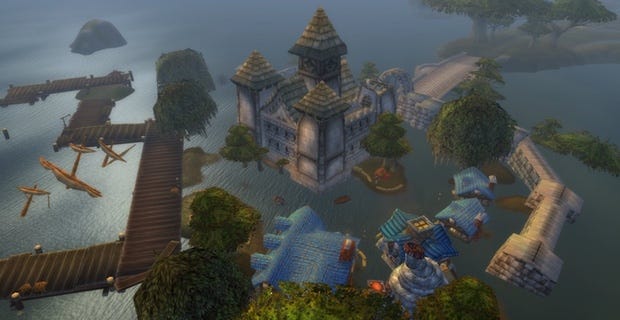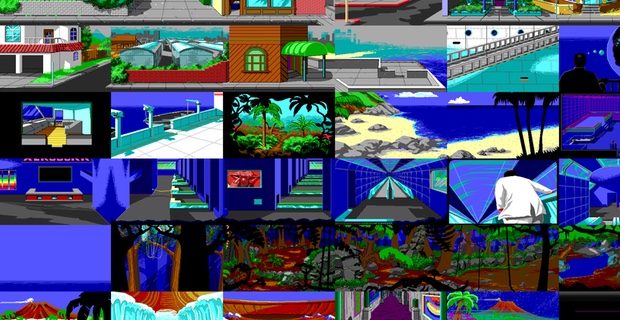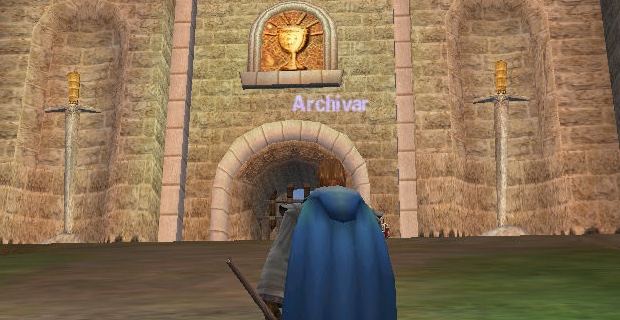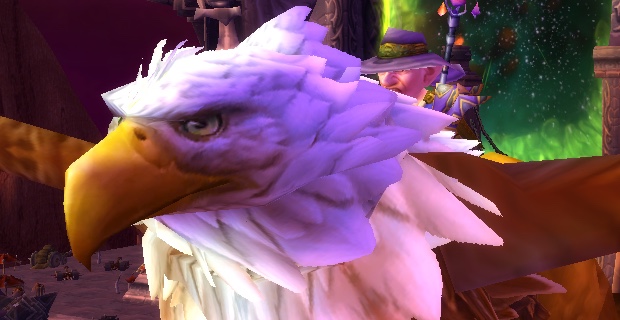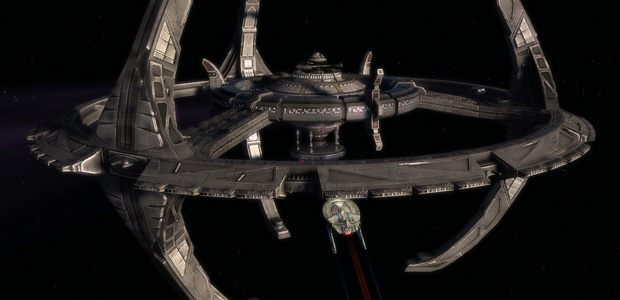The RPG Scrollbars: To Distant Shores
We're all going on a some-XP holiday
I'm on the road at the moment - not literally, that would make typing very dangerous - so unsurprisingly I've been pondering travel. Also regretting taking too long to see The Martian, and again being stunned by what Americans consider chocolate. But I can't think of even a tenuous connection between those and RPGs, so travel it is - and in particular, the rare joy that comes of not simply going somewhere new, but feeling that sense of distance behind you and a whole new horizon lying ahead.
When it comes to travel, I often point to Leisure Suit Larry 2, though no, it's not an RPG. It's not a good game in terms of design, but it's one I have a soft spot for. A big reason for that is that it felt epic. You start in Los Angeles, and from there you go aboard a cruise ship, to a beautiful holiday island full of nude beaches and KGB assassins, escape from there to go flying to safety, then realise it's actually not that safe after all and end up parachuting down onto the tropical Nontoonyt Island... all in an era of floppy disks. Lucasarts' Zak McKracken pulled off something similar, with an adventure spanning the entire world and also a trip to Mars, in an era where most adventures could barely handle an island or two, a small town, or some other nicely limited space.
In both cases, the sense of scale is largely a feint. Count up the number of rooms (screens) and it's not that impressive. This is Leisure Suit Larry 2. and this Zak McKracken, perhaps with an occasional missing bit here or there that I didn't spot on a cursory glance.
If so though, not many.
However, both managed to make their voyages effective with a few simple adventure gaming tricks - each area locked off and only accessible by physically travelling there somehow, via plane or boat or whatever, distinct differences in style to make it feel like you've arrived somewhere new, and presenting a world where other options are theoretically available, if not actually open during the game proper. Larry 2 for instance forces you to bail out of the plane even though you're actually heading somewhere else, while Zak gives you a choice of destinations with every trip that may or may not be of any use.
Their big advantage over RPGs though is that going in, the expectation is that they're going to be pretty small, in terms of screen count or scope. RPGs meanwhile love to boast huge maps and 50 hour experiences and whatever, to the point that scale, perceived or otherwise, is less a selling point than a core feature. The core design is typically built on forward momentum - your power increasing as you push through increasingly tough terrain that demands it, and which goes on for what often feels like forever. That can lead to great satisfaction in terms of exploring the map and finding cool things, but it's still rare to get that raw sense of being on a new shore, where everything may or may not actually be different, but at least might.
I don't think any game has achieved that effect quite as well as Final Fantasy VII, in which you have a pretty much endless linear adventure throughout the first disc that ultimately leaves you with the keys to your own airship and a whole world to go "Oh, so that's what the OTHER discs were for..." at. But I can think of quite a few examples that have had the same oomph for me. The uninterrupted ride from the mage tower in the forest to Camelot itself, past an entire world of bandits and other tough enemies. In World of Warcraft, the first time I took a ship to Menethil Harbour, going from a sunny day near Stormwind into the torrential rain of a brand new map, and stepping through the Dark Portal for the first time, into the broken Outland and immediately facing its full wrath.
In this awesome hat.
It's not simply about being somewhere new. The journey is crucial - it has to feel like one. That's why I like Warcraft's ships, which take you out to sea before cutting away to the new zone, and then bring you in a little way on the other side for good measure. Final Fantasy XIV also does it well. You spend most of your initial levelling in your home country - The Sand One, The Grass One or The Water One, before the story has you become an ambassador to your side and you're allowed to go further afield via airship, complete with lots of dramatic cut-scenes and epic music. There's no question that after doing this, you won't just save shoe-leather and warp everywhere using magic. What matters is that your character's first trip into the unknown feels impressive, and that you as the player can share in a degree of that excitement.
That's a very scripted experience though, and I don't mean to rule out the fun of going somewhere on a whim. It's often hard to wander in RPGs because of levelled content - in short, sure, you can have a friend teleport you to the gates of the Dark One's Fortress O'Evil at Level 1, but it's going to be a short visit. Rarely is there any actual point in directly ignoring the levelling structure and going somewhere before you're ready, even though that sort of off-the-cuff adventure can be pretty good fun.
I was very sad when World of Warcraft dropped its class-specific quests for instance, because running as an underlevelled Druid to pick up new forms was one of the few quests in that game that I can outright call an Adventure. A dangerous trek through foreign, hostile realms in search of power and knowledge? Well, huzzah! Sign me up and don't subsequently dumb things down like you slipped lead paint in their gruel. I liked the concept of the Warlock quests too.
The last true example of something like this working was in Star Trek Online. It isn't a game that caught my interest much, but I'll always remember firing it up the first time just to see if I could fly to Deep Space Nine, past a lot of mobs that were kinda coughing and going "Are you SURE you want to be heading out this way?" Yes! I replied, just about successfully evading them, and being thrilled to discover that not only could I make it to my favourite Star Trek series' home station, I could beam across and explore a surprisingly well done version of it on the inside. I had no idea that they'd built it in the game, and had expected to find some handwaved excuse for why it wasn't there. I was practically giddy to see what they'd done. Then I decided to push my luck and try Risa, and - yes! It was exactly as boring as it always was on the show!
These moments aren't just cool on their own terms, though that shouldn't be discounted. As said, RPGs love space - endless square-miles of terrain, hundreds of dungeons, mountain ranges, great oceans, whatever takes the designer's fancy. Of the time spent within them though, little has quite as much power as your first glimpse - of emerging from the tutorial with eyes blinking in the sun, looking around, and answering that first, all-important question - "So, what now?"
These 'distant shores' moments are echoes of that moment. They might literally be that, or a new city, or a new planet in a space game, a new time-zone in a time-travelling spree, or whatever else. They combine that sense of wonder with a sense of achievement. The first time you looked out at the world, it was its creators' work. This time, it's your home, and you approach this new corner of it not as some mere penniless noob covered in rags and wielding a rusty pig-sticker, but a granite-eyed veteran of adventure and war that it will come to respect.
Besides, even heroes need a holiday now and again.
